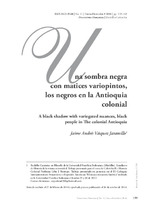| dc.contributor.author | Vásquez Jaramillo, Jaime Andrés | |
| dc.coverage.spatial | Seccional Medellín | spa |
| dc.date.accessioned | 2021-02-08T21:32:31Z | |
| dc.date.available | 2021-02-08T21:32:31Z | |
| dc.date.issued | 2014 | |
| dc.identifier.uri | http://hdl.handle.net/20.500.11912/8001 | |
| dc.description | p. 159 - 169 | spa |
| dc.description.abstract | El periodo colonial en la hispanidad fue en materia social imperativamente jerárquico. Las élites tenían por obligación demarcar las diferencias y así legitimar su poder y autoridad frente a las otras castas, sosteniendo así el statu quo que le era propicio para mantenerse en la cumbre de la sociedad. Entonces, eran estos los que tenían el poder de delimitar la pulsión de la sociedad, definiendo y objetivando todo su entorno, yendo inclusive en detrimento de los desiguales. De esa manera, la élite de la hispanidad se legitimó y se definió a sí misma en el menoscabo de los indígenas, los mestizos, los zambos y sobre todo, de los negros, que estaban sometidos a la esclavitud y al servicio de las mismas. Ahora bien, el mecanismo a través del que se demarcó dicho ideal de sociedad fue el discurso, en los que la dominación se daba con el lenguaje y no solo con las armas, grillos o cadenas. Esta demarcación fue discriminatoria en tal medida que se convirtió al negro en “algo”, en “cosa”, del cual se podía manipular, maltratar y explotar; en definitiva, fue en la cosificación del negro donde se legitimó la diferencia, la supremacía y la autoridad para dominar y relegar al negro por debajo de la esfera social. Así, este no era una persona, era una sombra negra detrás de su amo. | spa |
| dc.description.abstract | The colonial period in the Hispanic world was a hierarchical order in its social organization. The few elites had as a priority the segregation by making clear the differences in order to legitimize their power and authority over the inferior lineages. It was indeed how these elites maintained the “statu quo” which was a particular privilege in the social pyramid. It was through this unequal order the Hispanic elites created a gap between the ones in the higher position and the indigenous and the mix-raced groups, especially in relation to the black ones who were facing the slavery. From these segregated groups was possible to claim an ideal society throughout their discourses, and by dominating not only with weapons but also with the language. This unequal social distribution turned the black man into “something” at hand to be manipulated, mistreated and even exploited. It was by making the black a “thing” the white elites legitimized the social differences, and the supremacy over the others, particularly the back ones, who were nothing but a shadow over their owner. | spa |
| dc.format.mimetype | application/pdf | |
| dc.language.iso | spa | |
| dc.publisher | Universidad Pontificia Bolivariana | spa |
| dc.relation.ispartof | Pensamiento humanista | spa |
| dc.rights | Attribution-NonCommercial-NoDerivatives 4.0 International | * |
| dc.rights.uri | http://creativecommons.org/licenses/by-nc-nd/4.0/ | * |
| dc.subject | Negro | spa |
| dc.subject | Esclavitud | spa |
| dc.subject | Lenguaje | spa |
| dc.subject | Élite | spa |
| dc.subject | Black people | spa |
| dc.subject | Slavery | spa |
| dc.subject | Language | spa |
| dc.subject | Elite | spa |
| dc.title | Una sombra negra con matices variopintos, los negros en la Antioquia colonial | spa |
| dc.title.alternative | A black shadow with variegated nuances, black people in The colonial Antioquia | spa |
| dc.type | article | spa |
| dc.rights.accessRights | openAccess | spa |
| dc.type.hasVersion | publishedVersion | spa |
| dc.description.sectional | Medellín | spa |
| dc.identifier.instname | instname:Universidad Pontificia Bolivariana | spa |
| dc.identifier.reponame | reponame:Repositorio Institucional de la Universidad Pontificia Bolivariana | spa |
| dc.identifier.repourl | repourl:https://repository.unab.edu.co/ | |


